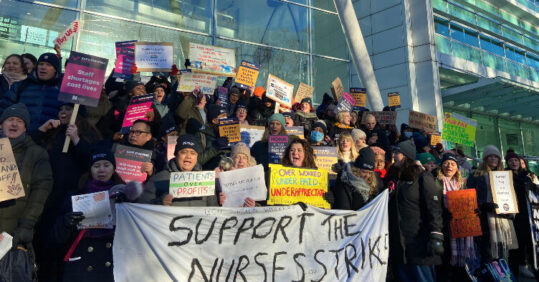Government launches consultation on changing NHS strike legislation

The government is considering introducing new industrial action regulations which would require NHS nurses and doctors to provide ‘minimum service levels’ during strikes.
The new minimum service level (MSL) regulations would be put in place ‘to protect patient safety’, health secretary Steve Barclay said today.
It comes as hospital consultants and junior doctors walk out on strike this week.
They will be walking out in September and October across four days, which will see ‘Christmas Day levels of staffing’ from both groups.
Related Article: New digital support for community nurses in 10-year plan
And it follows a series of strikes by NHS nurses in recent months over pay and working conditions.
The government said that while voluntary agreements between employers and trade unions can be agreed ahead of time, ‘they can lead to inconsistency across the country’, come with ‘significant uncertainty’ as they are ‘based on goodwill’, are ‘not always honoured or communicated in sufficient time’ and that this creates ‘an unnecessary risk to patient safety’.
It is consulting on introducing MSLs that would cover urgent, emergency and time-critical hospital-based health services and is seeking views on a set of principles for setting MSLs in regulations.
But Royal College of Nursing (RCN) chief nurse Professor Nicola Ranger said the college had ‘always been responsible in taking safe strike action, with concerns for patient safety at its core’.
‘However, nursing staff will tell you there are not safe staffing levels on non-strike days – and they are sometimes unable to provide the level of service and care patients need,’ she added.
‘We don’t believe these proposals will address the underlying long-term crisis in the NHS workforce and we will respond robustly to the consultation and share our experience of the past 12 months.’
Related Article: Nurse had to ‘freeze’ PPE during pandemic to re-use in care home, Covid inquiry hears
Professor Ranger urged the government to focus on ‘investing in the nursing workforce’, including by ‘paying staff fairly and addressing the chronic staff shortages that are damaging the health service’.
And British Medical Association council chair Professor Phil Banfield said that the union has been clear that any strike action taken by members preserves minimum levels of staffing to ensure patient safety.
He said: ‘If this government was serious about patient safety, it would not have deliberately run down the health service over the last 10 years, with the terrible, adverse effects that austerity has had on the health of the nation every day.’
Meanwhile, Mr Barclay said: ‘My top priority is to protect patients and these regulations would provide a safety net for trusts and an assurance to the public that vital health services will be there when they need them.
Related Article: Tell us what practice nursing means to you and potentially win £1,000
‘In the face of ongoing and escalating strike action, we will continue to take steps to protect patient safety and ensure the health service has the staff it needs to operate safely and effectively.’
A version of this article first appeared in our sister publication Pulse

See how our symptom tool can help you make better sense of patient presentations
Click here to search a symptom




